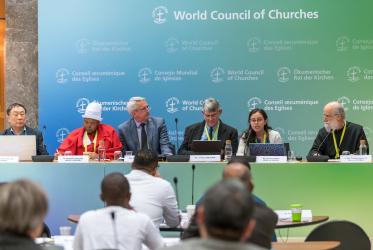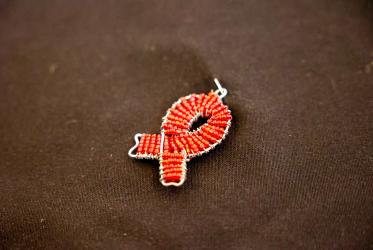Report of the meeting of primates of the Anglican Communion
Appendix III
ACNS2961
Canterbury, United Kingdom
16 April 2002
We, the Primates of the Anglican Communion, gathered in Canterbury, have received a report from the Council of Anglican Provinces in Africa on the impact of HIV/AIDS on the African continent. The presentation was led by the Archbishop of Cape Town, the Most Revd Njongonkulu Ndungane, who was mandated by the Primates in March 2001 to co-ordinate a Communion-wide strategy to address this immense global crisis of human suffering.
The HIV/AIDS pandemic affects every region of the world. It is, however, the poor who are hit hardest. It is the poorer nations, already weakened by the burden of debt, who need our support the most. This problem is not localised in one area of the world. It is a problem of increasing seriousness across the Global South, in many countries of Asia and the Pacific, Africa and Latin America. However, we have given particular attention in our commitment to the continent of Africa because it is in African nations that women, men and children are living with and dying from HIV/AIDS in greatest numbers. It is in Africa that the disease's destructive effects on social, and economic growth and development are most deeply felt.
We are grateful to Archbishop Ndungane for the leadership he has accepted on our behalf and commend the other African Primates and Churches for the direction they have given us. Recognising his strategic position within South Africa and within the Council of Anglican Provinces of Africa, we are pleased to re-mandate the Archbishop of Cape Town to spearhead our policy development and global strategy.
We raise our voices to call for an end to silence about this disease - the silence of stigma, the silence of denial, the silence of fear. We confess that the Church herself has been complicit in this silence. When we have raised our voices in the past, it has been too often a voice of condemnation. We now wish to make it clear that HIV/AIDS is not a punishment from God. Our Christian faith compels us to accept that all persons, including those who are living with HIV/AIDS, are made in the image of God and are children of God.
Our concern over this crisis arises from our ministry as pastors of God's people. We are called to this ministry by our God, the God of love. As pastors we are called to walk with those who are affected by this disease, to offer support and compassion and bring the Christian message of love, forgiveness and hope to the world. We are inspired and guided by the example of our Lord Jesus Christ who ministered to all without fear or discrimination.
We also have a solemn duty to speak a word to the world of the scale of this crisis. We wish to encourage collective action with government and non-governmental organisations, development programmes, health and pharmaceutical agencies and with Christians and people of good will everywhere. We believe that such co-ordinated and joint action is the only way to address the enormity of this challenge, and express our regret that certain governments continue to criticise those who lead us in this prophetic witness. We would remind both governments and pharmaceutical companies that it is a basic human right that all who require treatment have access to that treatment. We affirm, therefore, that safe and effective pharmaceutical treatment should be more widely available to alleviate suffering and extend life, and join our voice to the Secretary General of the United Nations in his plea that the profit motive not override the urgent humanitarian need for readily available and cheaper drugs.
We call upon our Churches to stand compassionately with those who are living with the disease, those who mourn and those who are dying. We encourage a realistic and Christian approach to funeral practices, so that families are not pauperised by bereavement. We seek to guide and educate our people in prevention of the disease and encourage Christian teaching which is frank and factual about abstinence and faithfulness. We reaffirm the teaching of the Church on marriage and commend the value of this God-given sign of committed and covenantal love.
We are committed to develop a global response to the AIDS pandemic and encourage a sharing of financial resources through the Anglican Consultative Council to provide assistance to Churches seeking to develop strategies and programmes to address this crisis. We will also seek to facilitate access to international funds which will support such programmes. We commend the six-fold response to AIDS which has been agreed by the All Africa Anglican AIDS Planning Framework to Churches beyond Africa in their strategic planning and policy development to confront this crisis and minister among all affected with this disease. We believe that for this task Christians are sustained by the love of God the Father, the work and example of our Lord Jesus Christ and the grace of the Holy Spirit.





